Inside Brexit: Was Britain right to leave the EU? Tory failures leave Brexiteers in limbo
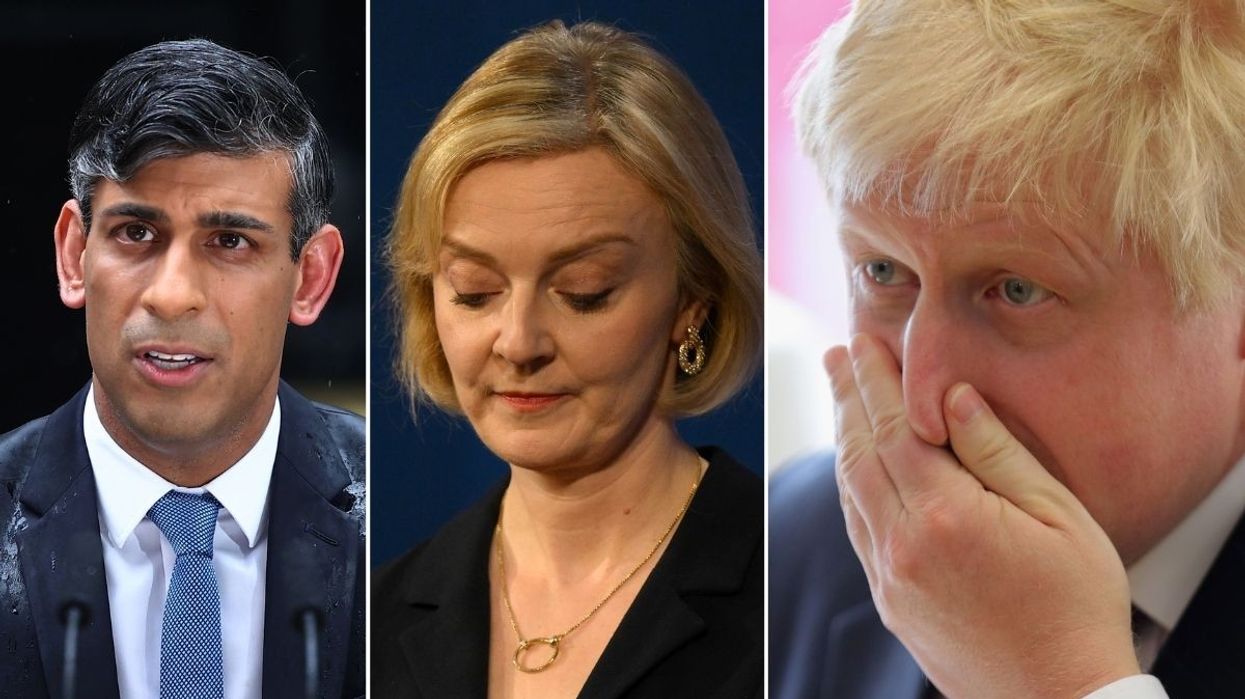
Leave voters are angry with Brexit failures but blame Tories for botched independence project
|GETTY

GB News reporter Jack Walters digs into who 2016 Brexit-backers blame for the difficulties facing Britain since the UK left the EU
Don't Miss
Most Read
Latest
"The Sunak Government largely gave up promoting Brexit or explaining the benefits to the British people," Boris Johnson's former EU negotiator Lord David Frost told GB News.
"Few of its members had supported Brexit and indeed they seemed to regard it as some kind of natural disaster about which the less said the better.
"In these circumstances, it is testament to the strength of the pro-Brexit feeling that over 40 per cent of Brits are still opposed to rejoining."
Lord Frost's remarks make for pretty somber reading for any one of the 17.4 million people who still believe Britain's future is better off outside the Brussels bloc.
However, and sadly for many, the last few years have witnessed a drastic shift in mood towards Brexit.
Following a high after the UK's rapid vaccine roll-out, YouGov's latest survey found the UK would vote to rejoin by a margin of 59 per cent to 41 per cent.
 Lord Frost speaks at PopCon | PA
Lord Frost speaks at PopCon | PANow, I am more than certain that the actual figure would narrow, perhaps even moderately reverse, once arguments are had about the new relationship the UK must adopt with the EU.
I'm sure even high-flying city boys yearning for a return to the Single Market would struggle to stomach adopting the Euro.
It’s no shock that Omnisis revealed the result would reverse to 55 per cent supporting staying out and just 45 per cent wanting to rejoin when the single currency is bolted on as a requirement.
I also cannot imagine a situation where even the most Europhile campaigner can say with a straight face that the EU is the bastion of liberal democracy it supposedly was in 2016.
And don't even mention the prospect of Schengen or coughing up extra cash after losing Margaret Thatcher's rebate.
The truth is, the EU remains, in many ways, even more democratically-deficient, centralising further powers to Brussels on issues ranging from migration to state aid.
It would come as no surprise, therefore, that Brexiteers do not blame post-EU difficulties on the project itself.
YouGov found that just 19 per cent of 2016 Brexit-backers blame the decision to leave the EU, well below the 60 per cent from all respondents.
Instead, 71 per cent blamed the Government for stifling the UK's ability to unleash itself from the shackles of overzealous Brussels bureaucracy.
And it is certainly something echoed by those most heavily involved in the 2016 referendum.
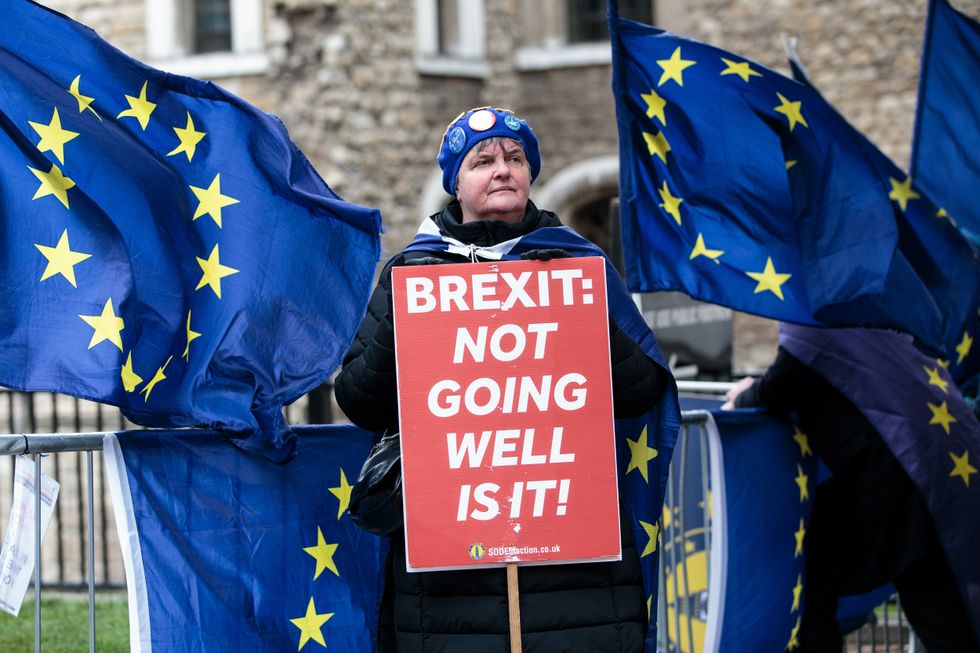 An anti-Brexit campaigner in Westminster | GETTY
An anti-Brexit campaigner in Westminster | GETTY"Tory Brexiteers promised to significantly level up the regions, truly devolve power to communities and cut low skilled immigration to create a truly high-skilled workforce," a former Vote Leave insider told GB News.
"When in office, they pursued exactly the opposite strategy and were rightly punished at the 2024 General Election."
Another Brexit veteran added: "The country voted to leave the European Union because we wanted control of our borders.
"Look around and it is not hard to see why people feel that it has been a failure.
"Over two million people have come to Britain in the last two years. The change this has inflicted on communities is huge, the money promised for the NHS has been entirely absorbed by a dramatic population increase, and the rest of our public services are on their knees.
"The Conservative Party had eight years after that historic vote to seize the opportunities. Instead they descended into internal warfare, leaving us permanently stuck in Europe’s regulatory orbit.
"Brexit was a moment to reset our country’s history but thus far our craven political class have continued to drive us down the pathway on managed decline."
After the Tory Party, engulfed in its own half-a-century European civil war, finally wrapped itself up in the Brexit flag, the legacy of the UK's future outside the EU became directly connected with the trials and tribulations of successive Conservative Prime Ministers.
Support for Brexit has fluctuated about as much as support for the Tories, with staying out opening up a five-point lead when the Tories snatched Hartlepool in May 2021.
However, rejoin established an 18-point advantage as Liz Truss' disastrous mini-budget eroded any remaining faith in the Conservative Party, failing to recover thereafter.
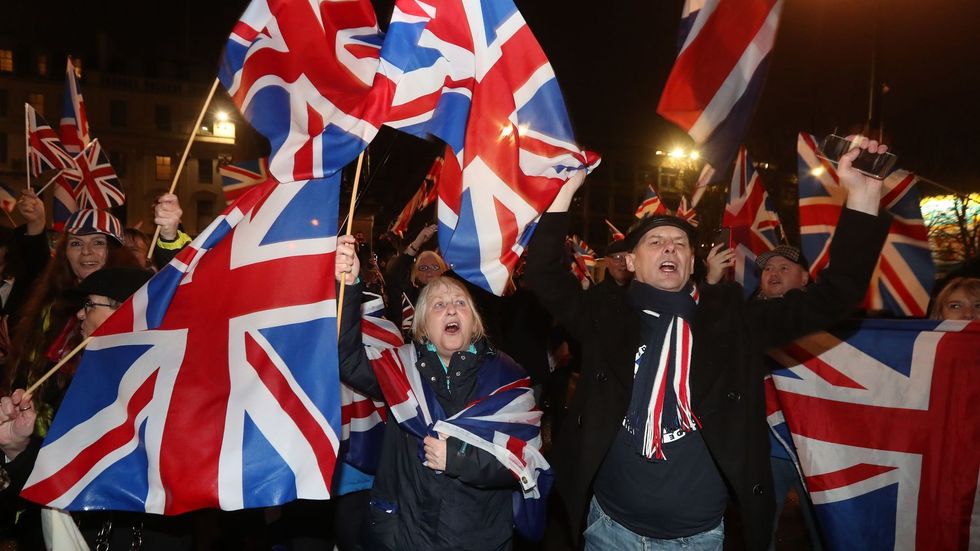 Brexiteers were celebrating when Britain officially left the EU in January 2020 | PA
Brexiteers were celebrating when Britain officially left the EU in January 2020 | PAIt will inevitably be about either taking back control of the cross-party Brexit project or the Tory Party re-establishing itself as a serious political force for the popularity of staying out of the EU to return.
Fred de Fossard, who worked as a Special Adviser for ex-Brexit Opportunities Minister Sir Jacob Rees-Mogg, told GB News: “The Tory Party has always been rather uncomfortable with Brexit, and it was forced on it by the public rather than it being something it wanted to do.
“By the time we actually did leave the European Union, we thought Boris Johnson's election victory in 2019 would have united the party. But it looks like those divisions over Brexit were re-emerging.”
He added: “It was incredibly infuriating seeing Ministers and Special Advisers who are in this position, whose only political role was to get Brexit done, deliver Brexit, seize the Brexit opportunities, just undermining it at every turn. It makes the future of Brexit quite vulnerable.”
But what areas have led to the sharpest dip in support for Brexit?
Immigration was seen by many as a cornerstone of the Brexit debate.
Net immigration stood at 270,000 in 2015, with 184,000 coming from EU member states.
Vote Leave campaigners were keen to highlight how the figure represented adding a population the size of Oxford to the UK every year just from EU migration.
However, net migration reached the record-breaking figure of 745,000 in 2022 and only dropped to 685,000 the following year.
The situation last year would represent total net migration equalling the size of Oxford four times over.
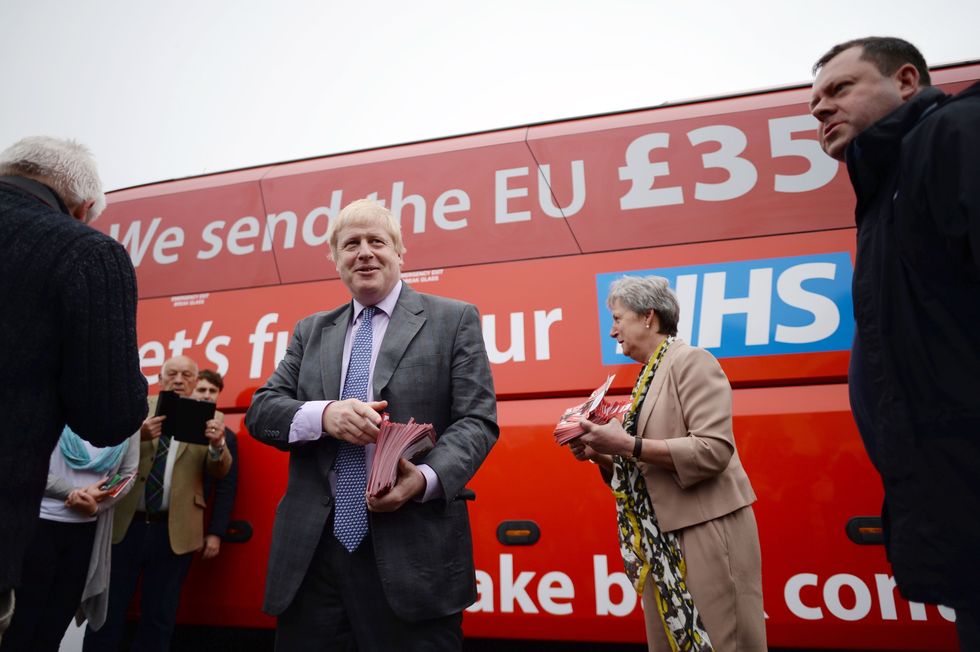 Boris Johnson speaks to Vote Leave campaigners as he boards the Vote Leave campaign bus in Truro, Cornwall | PA
Boris Johnson speaks to Vote Leave campaigners as he boards the Vote Leave campaign bus in Truro, Cornwall | PAAnd illegal migration adds further fuel to the fire, with more than 15,000 people crossing the Channel in 2024 so far.
The figure peaked at a record-breaking 45,774 in 2022, dropping slightly to 29,437 crossing in 2023.
The situation is a far-cry from what the proponents of Brexit were promising to voters in 2016.
It explains why, for the most part, support for Reform UK surged last month as the populist party returned five MPs with more than four million votes.
De Fossard explained: “I think the reason why there was so much discontent around it is probably mainly because of immigration.
“A line Remainers always wanted to push is that the high immigration we've seen after leaving the EU was somehow inevitable, which is just not true at all.
“Leaving the European Union was sold by many, many politicians as a way of cutting immigration, literally taking back control of our borders, literally about ending free movement.
“The Government decided to triple immigration. I think when you do something like that, it's a rather difficult situation when immigration increases and then taxes also increase.”
Arguments about sovereignty were seen as a safe bet for Brexiteers in 2016, with Remainers determined to return the focus to dull economic arguments.
 Migrants crossing the Channel | GETTY
Migrants crossing the Channel | GETTYDespite escaping more than 200,000 new pages of EU bureaucracy and laws in the last four years, the UK keeps too many measures on its books.
Ex-Business Secretary Kemi Badenoch completed an embarrassing climbdown on plans to burn EU-era laws copied post-Brexit.
It was initially estimated that cutting away the regulations would slash around £1biillion worth of Brussels-born red tape.
And it’s not just about the symbolism about removing red tape that is important.
The Vote Leave campaign was keen to push for the removal of VAT on energy bills during the referendum.
However, consumers were still whacked with the punitive levy throughout the cost-of-living crisis as fuel bills skyrocketed after Russia’s invasion of Ukraine.
Other regulatory shifts, including legislating the end of live animal exports and introducing more sustainable fishing proceedings, reaped significant rewards.
It’s when it comes to costly public procurement rules and loosening drug testing where delays could be more easily avoided.
However, arguments about the economy also proved decisive in winning over moderate Eurosceptics.
The UK’s economy has experienced a slump since Covid hit UK shores in March 2020.
Despite a moderate revival, food shortages and inflation peaking at 11.1 per cent inevitably made for grim reading.
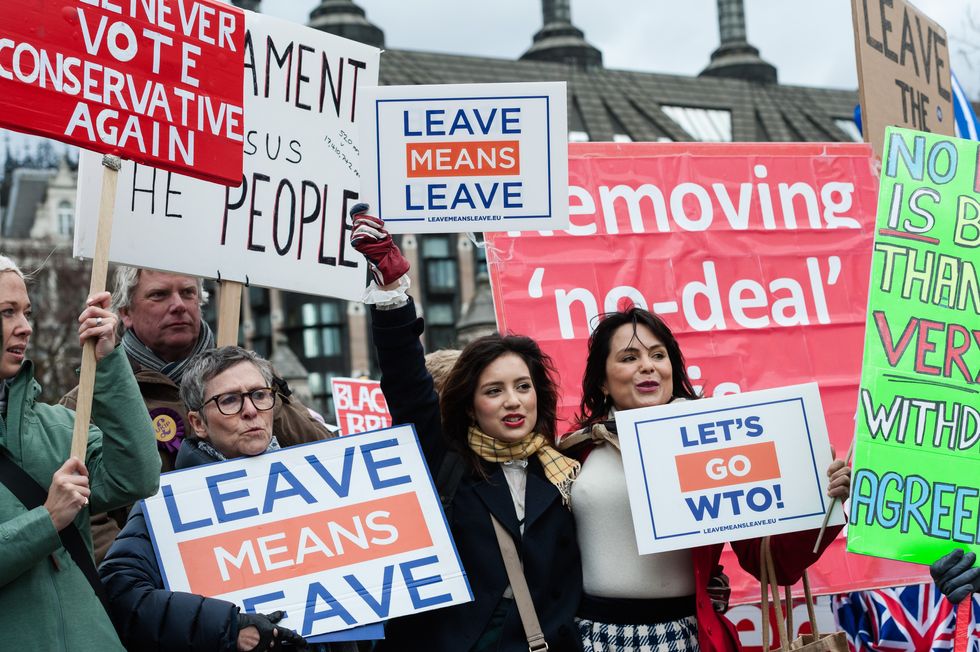 Protesters demonstrating in favour of Brexit | Getty
Protesters demonstrating in favour of Brexit | GettyDe Fossard warned: “The vast majority of the reasons why we've had a difficult economic picture have been the pandemic followed by the energy spike following the war in Ukraine.
“A terrible immigration policy has also not increased productivity or skills. It's actually made the situation worse.
“These are not Brexit related facts. The economic situation in Europe is pretty terrible as well. Just look at what's happened to industry in Germany, look at what happened to the economic figures in the Eurozone and in many, many measures, Britain has actually done marginally better than the European Union countries.
“The overall picture has been quite bad and when we have inflation above 10 per cent in 2022 it's unsurprising that the public are going to blame the biggest significant change in recent years, which was leaving the European Union, even if that's not technically true or technically causal.”
Queues at Dover and complications in trade added further to the perception that Brexit was proving disastrous for the economy.
A number of reports also found Brexit was damaging the UK’s competitiveness.
Goldman Sachs found post-Brexit Britain “significantly underperformed” compared to other advanced economies.
Inflation was also blamed on Brexit, with polls consistently suggesting the public attributed price hikes to the end of the UK’s relationship with the EU.
Bank of England Governor Andrew Bailey added: “It has led to a reduction in the openness of the UK economy, though over time new trading relationships around the world should, and I expect will, be established.
“Of course, that requires a commitment to openness and free trade.”
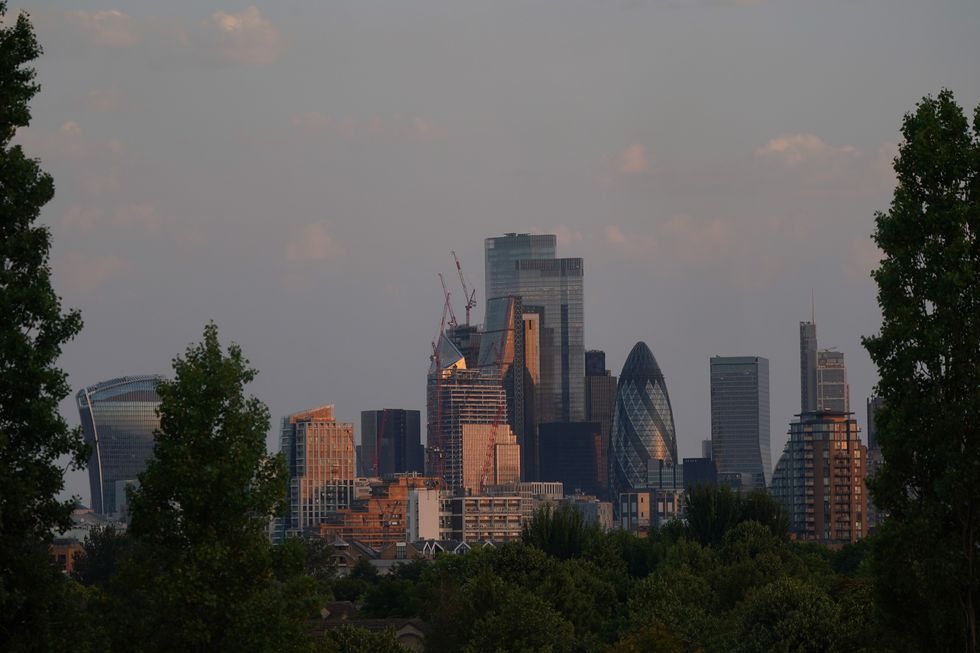
Skyline of the City of London during sunrise
| PAEconomist Catherine Mann also said: “The UK has also been affected by a third type of shock which makes it unique: no other country chose to unilaterally impose trade barriers on its closest trading partners.”
But has it been all bad?
In truth, the picture of post-Brexit Britain is somewhat mixed.
“The most important policy change since leaving the European Union has been the Edinburgh reforms which have gone through,” De Fossard claimed. “And those could have been more exciting but overall those are going to be really good and they will hopefully make the City of London more competitive, attract more capital travel investment and make the Square Mile more innovative.”
He added: “It’s undoubtedly important because, after all, the City is the jewel in the crown of the British economy. But then also there have been disappointing things.
“We haven't got rid of GDPR, which is a real shame. We haven't reformed the habitats regulations which were getting in the way of building new houses, building new infrastructure, and making the cost of things go up.
“There are loads and loads of legacy EU regulations that we haven't got rid of.
“That should largely lay at the feet of Ministers and MPs who either didn't do the work, didn't want to, or were too afraid of getting rid of these regulations.”
And more broadly GDP growth among Europe’s four biggest economies hardly paints a bad picture for the UK.
Britain experienced eight per cent growth since it held the referendum, roughly the same as France.
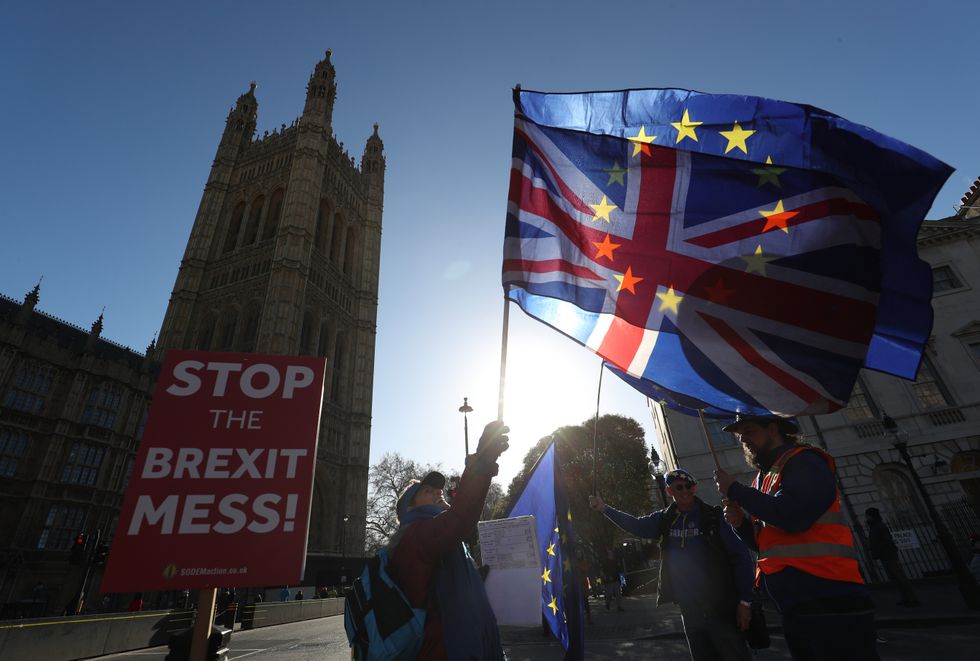 Brexit has become a divisive topic in Britain | PA
Brexit has become a divisive topic in Britain | PAMeanwhile, Germany and Italy were somewhat lower at around six per cent.
The UK continued to outpace Germany during its recovery from Covid.
However, Italy and France admittedly fared much better.
Even exports and imports haven’t witnessed the collapse many feared, both rising by around 11 per cent.
London also keeps a grip on its crown as Europe’s top city for foreign financial services investment and a potential Brexit exodus of jobs fundamentally failed to materialise.
This isn’t to say Brexit has been completely plain sailing, we’ve had paperwork complications at Dover, issues with Northern Ireland and added queues at airports.
However, broadly sluggish growth and an illegal immigration crisis infects the economies on either side of the Channel, with Mediterranean crossings splitting EU member states.
Bailey also conceded Brexit “created opportunities” for the UK, adding: “We have protected, and in a sense ensured, that much of the market and much of the industry remains here.”
Explaining the economic opportunity presented by Brexit, De Fossard said: “The actual achievements of Brexit so far they've been modest, but they haven't been terrible by any means.
“The Trade and Cooperation agreement we signed with the EU is the most comprehensive free trade agreement the EU has ever had since it's a tariff free and quota free trade agreement with our nearest economic neighbour.
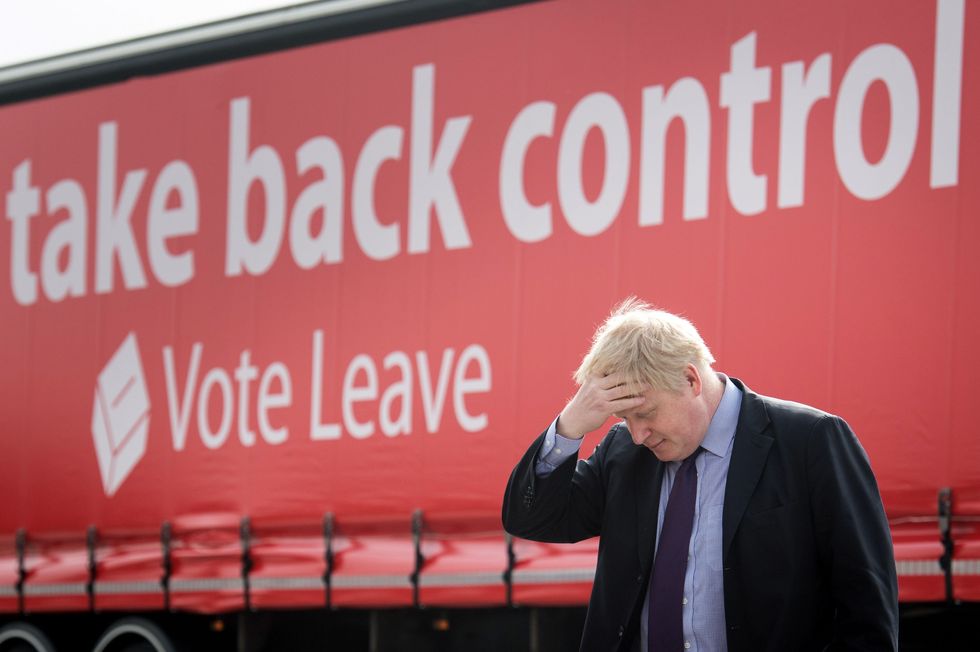
Boris Johnson on the Vote Leave campaign
| PA“It has enabled us to sign trade deals with other groups around the world. The most exciting one is CPTPP, which should be ratified imminently.
“The ratification of CPTPP is really important because then it puts Britain in a really unique position in the global trading economy because we have this trade deal with the EU, we have trade deals with Australia and New Zealand, we have trade deals with Japan, with Canada, and then we have this Pacific Rim arrangement. We literally could not have done this inside the European Union.”
Despite some clear benefits of Brexit, Leavers have been less than ready to combat a tirade of criticism about global trends impacting the UK, ranging from Covid-induced inflation to the migrant crisis.
The Tories released a far-from convincing dossier of Brexit benefits which was over-complicated and under-thought.
Instead, there's the prevailing view, which the BBC was even forced to issue corrections for, that the Office for Budget Responsibility had claimed Brexit already cost the UK economy four per cent of GDP.
The figure is actually a long-term estimate and I rather agree with Michael Gove's scepticism about acronym doomsters anyway.
I've seen more than enough economic revisions in the past few years, including one altering its estimates to put the UK above its EU rivals rather than languishing behind.
However, if Eurosceptics truly want to maintain the UK's newfound independence, they need to turbo-charge efforts to reassert the narrative on Brexit before it's too little, too late.










